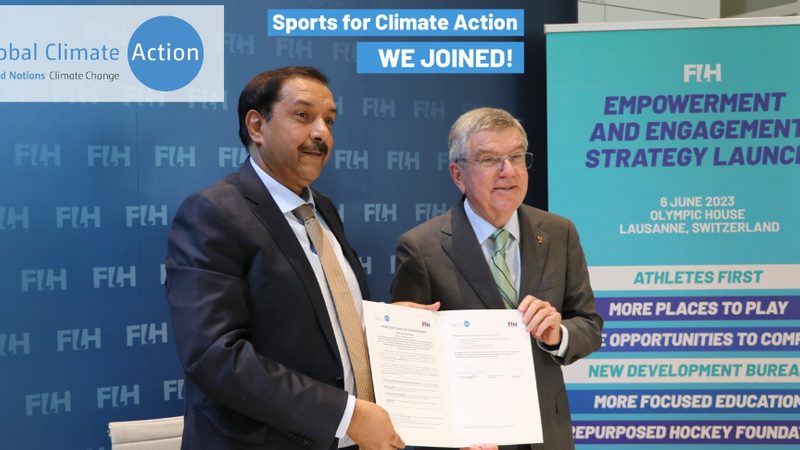
As a further major step of its Sustainability Strategy launched in November last year, the International Hockey Federation (FIH) is delighted to announce that it has joined the UN Framework Convention for Climate Change (UNFCCC) ‘Sports for Climate Action Framework’.
FIH’s commitment was signed yesterday by FIH President Tayyab Ikram, in attendance of IOC President Thomas Bach, at the IOC Olympic House in Lausanne, where the FIH Executive Board (EB) was holding its second session of the year.
By joining the Sports for Climate Action Framework, organizations commit to supporting its overarching mission to help drive the sports sector to net-zero emissions by mid-century, in line with a 1.5°C pathway. Organizations also commit to the Framework’s various principles and values related to collaboration, education and advocacy for climate action.
Recognizing the critical need for all stakeholders around the globe to help implement the Paris Agreement and to accelerate the transformative change needed to reach greenhouse gas emission neutrality (i.e. climate neutrality) in the second half of the twenty-first century, FIH supports the vision outlined in the UNFCCC Sports for Climate Action Framework.
FIH President Tayyab Ikram said: “As an organisation that firmly believes in the power of sport to act as a catalyst for positive change in society, FIH fully supports the principles enshrined in the UN Sports for Climate Action Framework. We are determined to make a difference to protect the environment and enhance the climate action agenda amongst all hockey stakeholders. This has become a core business for sports, and for hockey in particular.”
By joining the Framework, FIH has committed to:
- Setting an interim and long-term emissions reduction target (50% emissions reduction by 2030 as a minimum and a net-zero emissions target by 2040)
- Consistently measuring and publicly disclosing its annual climate footprint and emissions reductions progress
- Submitting a concrete plan for reaching net zero emissions
- Communicating this commitment to its stakeholders and the general public
- The following climate action principles:
- Undertake systematic efforts to promote greater environmental responsibility
- Reduce overall climate impact
- Educate for climate action
- Promote sustainable and responsible consumption
- Advocate for climate action through communication
Here are a few concrete examples of how FIH shall implement this commitment:
- FIH has already kicked off its carbon footprint measurement project with assistance from the International Olympic Committee (IOC) and their partner Deloitte
- The Paris 2024 Olympic field, to be supplied by FIH partner Polytan, will be a carbon zero turf, with more than 60% of the artificial turf made out of materials from re-growable sugar cane
- The need to water fields that are used in top level competitions will stop after the Olympic Games Paris 2024, with the 2026 FIH Hockey World Cup the first to be played on “dry” turf

























